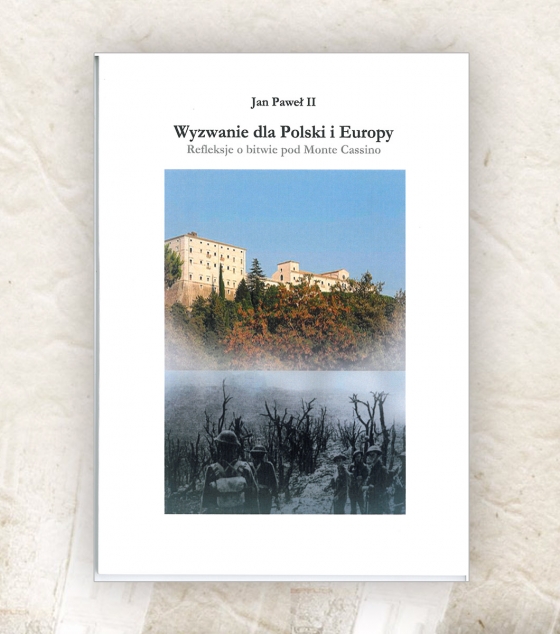On the 70th anniversary of the battle of Monte Cassino, the Centre for Documentation and Research of the Pontificate issued another, interesting publication. This time it is a collection of speeches and homilies of John Paul II entitled Challenges for the Polish and Europe. Reflections on the Battle of Monte Cassino. The papal montecassiniana were gathered and prepared by Fr. Andrzej Dobrzynski.
“Saint John Paul II was not only a providential guide, leading the followers of Christ to eternal homeland – as we can read in the introduction – but also showed the important role played by love and service to an earthly homeland. As a shepherd of the universal Church he taught respect for every man and boldly demanded the rights of nations to independence and to shaping their own culture. His prophetic message of peace building in the world that should be based on Christian moral values and inalienable human rights and the rights of nations was maturing on the Polish soil of dramatic history, especially in the twentieth century, of which he was an eyewitness.
The fight for Monte Cassino was one of the decisive battles crucial for the defeat of Nazi Germany. The ancient Benedictine abbey, converted by the Nazis into a stronghold, was captured May 18, 1944 by the soldiers of the 2nd Corps of General Wladyslaw Anders. This victory is regarded as a triumph of the Polish army and constitutes a symbol reminding of the price that had to be paid for the freedom of the Fatherland.
(…) Most of the soldiers of the 2nd Corps had gone through the Soviet gulags and through the Middle East and Italy they were going to the homeland. Fighting together with the Allied armies, they were liberating from the occupying forces the Italian people. Unfortunately, due to the Soviet imperialism and political betrayal by Western powers, Poland for decades fell under Soviet domination. The soldiers could not return to their country, they had to remain in exile. The few who returned were often persecuted by the communist regime. So what was the meaning of the fight – ‘for our freedom and yours’ – of the Polish soldiers? What sense did the sacrifice of their lives have? Is the heroism of the Polish soldiers from Monte Cassino after 70 years still valid and able to move the minds and hearts of the people?
Answers to these questions can be found in the speeches that John Paul II gave during his pontificate on the occasion of the celebrations of the anniversaries, starting from the 35th anniversary in 1979, in which he took part celebrating mass at the field altar in Monte Cassino. He delivered them during subsequent anniversaries, every five years, until the 60th anniversary in 2004. (…) Speaking on these occasions, John Paul II did not judge the battle from the point of view of military strategy, but showed the importance of the victory in the light of Christian faith. He reminded that the story is not only ‘a great proving ground of events’, but also ‘an open book of learning’, from which conclusions should be drawn for the future. He stressed the spiritual and moral meaning of the battle of Monte Cassino. As a witness of faith and spokesman of moral order, he stressed the need for reflection transformed into a prayer for those who had died and into a sense of gratitude for the courage of the Polish soldiers. And according to him this reflection should lead to the efforts towards securing peace among nations.
(…) It is hoped that this small little collection of papal texts will contribute to deepen the reflection on the meaning and moral significance of the battle of Monte Cassino. It will also be a testimony of John Paul II’s love for Poland and of his grateful memory of all who fought for its independence and gave their lives for it.” (From the introduction to the publication)
